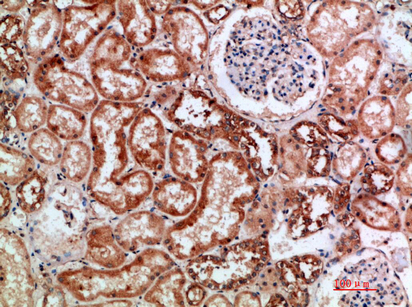BTN3A1/2/3 Polyclonal Antibody
- Catalog No.:YT5948
- Applications:IHC;IF;ELISA
- Reactivity:Human
- Target:
- BTN3A1/2/3
- Gene Name:
- BTN3A1/2/3 BTF3/4/5
- Protein Name:
- Butyrophilin subfamily 3 member A1/2/3 (CD antigen CD277)
- Human Gene Id:
- 11119
- Human Swiss Prot No:
- O00481/P78410/O00478
- Immunogen:
- Synthetic peptide from human protein at AA range: 41-90
- Specificity:
- The antibody detects endogenous BTN3A1/2/3
- Formulation:
- Liquid in PBS containing 50% glycerol, 0.5% BSA and 0.02% sodium azide.
- Source:
- Polyclonal, Rabbit,IgG
- Dilution:
- IHC 1:50-200, ELISA 1:10000-20000. IF 1:50-200
- Purification:
- The antibody was affinity-purified from rabbit antiserum by affinity-chromatography using epitope-specific immunogen.
- Concentration:
- 1 mg/ml
- Storage Stability:
- -15°C to -25°C/1 year(Do not lower than -25°C)
- Background:
- The butyrophilin (BTN) genes are a group of major histocompatibility complex (MHC)-associated genes that encode type I membrane proteins with 2 extracellular immunoglobulin (Ig) domains and an intracellular B30.2 (PRYSPRY) domain. Three subfamilies of human BTN genes are located in the MHC class I region: the single-copy BTN1A1 gene (MIM 601610) and the BTN2 (e.g., BTN2A1; MIM 613590) and BTN3 (e.g., BNT3A1) genes, which have undergone tandem duplication, resulting in 3 copies of each (summary by Smith et al., 2010 [PubMed 20208008]).[supplied by OMIM, Nov 2010],
- Function:
- similarity:Belongs to the immunoglobulin superfamily. BTN/MOG family.,similarity:Contains 1 B30.2/SPRY domain.,similarity:Contains 2 Ig-like V-type (immunoglobulin-like) domains.,tissue specificity:Highly expressed in heart, pancreas and lung, Moderately expressed in placenta, liver and muscle.,
- Subcellular Location:
- Cell membrane ; Single-pass type I membrane protein .
- Expression:
- Detected on T-cells, natural killer cells, dendritic cells and macrophages (at protein level). Ubiquitous. Highly expressed in heart, pancreas and lung, Moderately expressed in placenta, liver and muscle.
- June 19-2018
- WESTERN IMMUNOBLOTTING PROTOCOL
- June 19-2018
- IMMUNOHISTOCHEMISTRY-PARAFFIN PROTOCOL
- June 19-2018
- IMMUNOFLUORESCENCE PROTOCOL
- September 08-2020
- FLOW-CYTOMEYRT-PROTOCOL
- May 20-2022
- Cell-Based ELISA│解您多样本WB检测之困扰
- July 13-2018
- CELL-BASED-ELISA-PROTOCOL-FOR-ACETYL-PROTEIN
- July 13-2018
- CELL-BASED-ELISA-PROTOCOL-FOR-PHOSPHO-PROTEIN
- July 13-2018
- Antibody-FAQs
- Products Images

- Immunohistochemical analysis of paraffin-embedded human-kidney, antibody was diluted at 1:200



